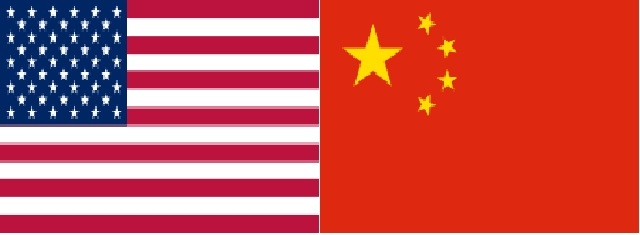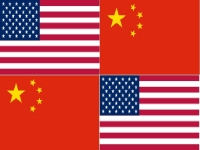Vips
USA & CHINA Build on Paris Agreement & Strengthen Climate Change Cooperation
Washington DC on June 8, 2016

USA FLAG - CHINA FLAG
On June 6, U.S. Secretary of State John Kerry, U.S. Treasury Secretary Jacob J. Lew, Chinese State Councilor Yang Jiechi and Chinese Vice Premier Wang Yang chaired the high-level U.S.-China Joint Session on Climate Change. Coming just after the opening session of the 8th U.S.-China Strategic and Economic Dialogue, the dialogue was an opportunity to discuss key areas of cooperation and further strengthen joint efforts on climate change, an important pillar of the bilateral relationship. This is the fourth Joint Session on Climate Change that Secretary Kerry and Secretary Lew have co-chaired.
The Joint Session offered a chance to review climate progress and achievements over the past year. Chief among them was the historic Paris Agreement, which would not have been possible without the leadership of the United States and China. Both countries reaffirmed their plans to join the Agreement as early as possible this year, and agreed to work together to urge others to do so.
In the high level discussion, the United States and China committed to continue working together to achieve successful climate outcomes in other key multilateral fora. These include: reaffirming their support for adopting an ambitious hydrofluorocarbon (HFC) phasedown amendment to the Montreal Protocol this year that could prevent up to half a degree Celsius of warming (nearly one degree Fahrenheit); supporting the adoption of an International Civil Aviation Organization (ICAO) Assembly Resolution this fall for a market based measure to address CO2 emissions from international aviation; and agreeing to work together to drive strong G-20 outcomes on climate change and clean energy, including on heavy-duty vehicles.
Both Secretaries Kerry and Lew highlighted the need to address the climate impacts of overseas investments.
The Strategic & Economic Dialogue was hosted concurrently with the second U.S.-China Climate-Smart / Low-Carbon Cities Summit to showcase the expansion of sub-national climate cooperation and leadership. Attended by leaders from 47 Chinese cities and provinces and 17 U.S. cities, counties, and states, the event saw 66 cities from both countries endorse the U.S.-China Climate Leaders Declaration, bringing the total number of endorsements to [75]. The cities declared their intention to establish ambitious climate targets, regularly report on greenhouse gas emissions, establish climate action plans, and expand bilateral cooperation.
The Strategic & Economic Dialogue was hosted concurrently with the second U.S.-China Climate-Smart / Low-Carbon Cities Summit to showcase the expansion of sub-national climate cooperation and leadership. Attended by leaders from 47 Chinese cities and provinces and 17 U.S. cities, counties, and states, the event saw 66 cities from both countries endorse the U.S.-China Climate Leaders Declaration, bringing the total number of endorsements to [75]. The cities declared their intention to establish ambitious climate targets, regularly report on greenhouse gas emissions, establish climate action plans, and expand bilateral cooperation.
Additionally, the United States and China demonstrated progress by releasing dozens of outcomes with results from concrete cooperation on climate change and clean energy, a number of them developed through the U.S.-China Climate Change Working Group (CCWG). The CCWG was launched by Secretary Kerry and State Councilor Yang in 2013 and is the premier mechanism for U.S.-China cooperation and dialogue on climate change.
- Under the CCWG the two countries launched new cooperation on Power Consumption, Demand, and Competition designed to support increasing utilization and integration of renewable energy resources in China.
- The two countries formally launched the 'Race to Zero Emissions' program to support increased deployment of electric and other zero-emission urban buses (https://www.transportation.gov/R2ZE). In parallel, China has accelerated its timeline for finalizing the world-class 'China 6/VI' emissions standards for light- and heavy-duty vehicles, and announced, for the first time, its intention to implement them nationwide by 2020.
- The two countries formally launched the 'Race to Zero Emissions' program to support increased deployment of electric and other zero-emission urban buses (https://www.transportation.gov/R2ZE). In parallel, China has accelerated its timeline for finalizing the world-class 'China 6/VI' emissions standards for light- and heavy-duty vehicles, and announced, for the first time, its intention to implement them nationwide by 2020.
- Through technical exchanges under the CCWG, the United States will assist China´s efforts to develop a robust national greenhouse gas reporting program, particularly as it rolls out its emissions trading systems.
The CCWG released its annual report documenting progress in each initiative.
Preceding the S&ED, U.S. Special Envoy for Climate Change Jonathan Pershing held an enhanced policy dialogue on June 5 with his counterpart, China´s Special Representative for Climate Change Affairs Xie Zhenhua, to advance discussions on how to build on the positive momentum of the Paris Agreement, make progress in key multilateral climate fora this year, and continue to build on the strong bilateral cooperation between the two countries.
The CCWG released its annual report documenting progress in each initiative.
Preceding the S&ED, U.S. Special Envoy for Climate Change Jonathan Pershing held an enhanced policy dialogue on June 5 with his counterpart, China´s Special Representative for Climate Change Affairs Xie Zhenhua, to advance discussions on how to build on the positive momentum of the Paris Agreement, make progress in key multilateral climate fora this year, and continue to build on the strong bilateral cooperation between the two countries.
Source : U.S Department of Justice - The United States and China Build on Paris Agreement and Strengthen Climate Change Cooperation, Washington, DC on June 8, 2016. Coming just after the opening session of the 8th U.S.-China Strategic and Economic Dialogue.
Ruby BIRD
http://www.portfolio.uspa24.com/
Yasmina BEDDOU
http://www.yasmina-beddou.uspa24.com/
Ruby BIRD
http://www.portfolio.uspa24.com/
Yasmina BEDDOU
http://www.yasmina-beddou.uspa24.com/
Ruby Bird Yasmina Beddou Climate Change Cooperation Paris Agreement Strengthen United States China June 6 Secretary Of State John Kerry Chinese Vice Premier Wang Yang Strategic And Economic Dialogue
Liability for this article lies with the author, who also holds the copyright. Editorial content from USPA may be quoted on other websites as long as the quote comprises no more than 5% of the entire text, is marked as such and the source is named (via hyperlink).






